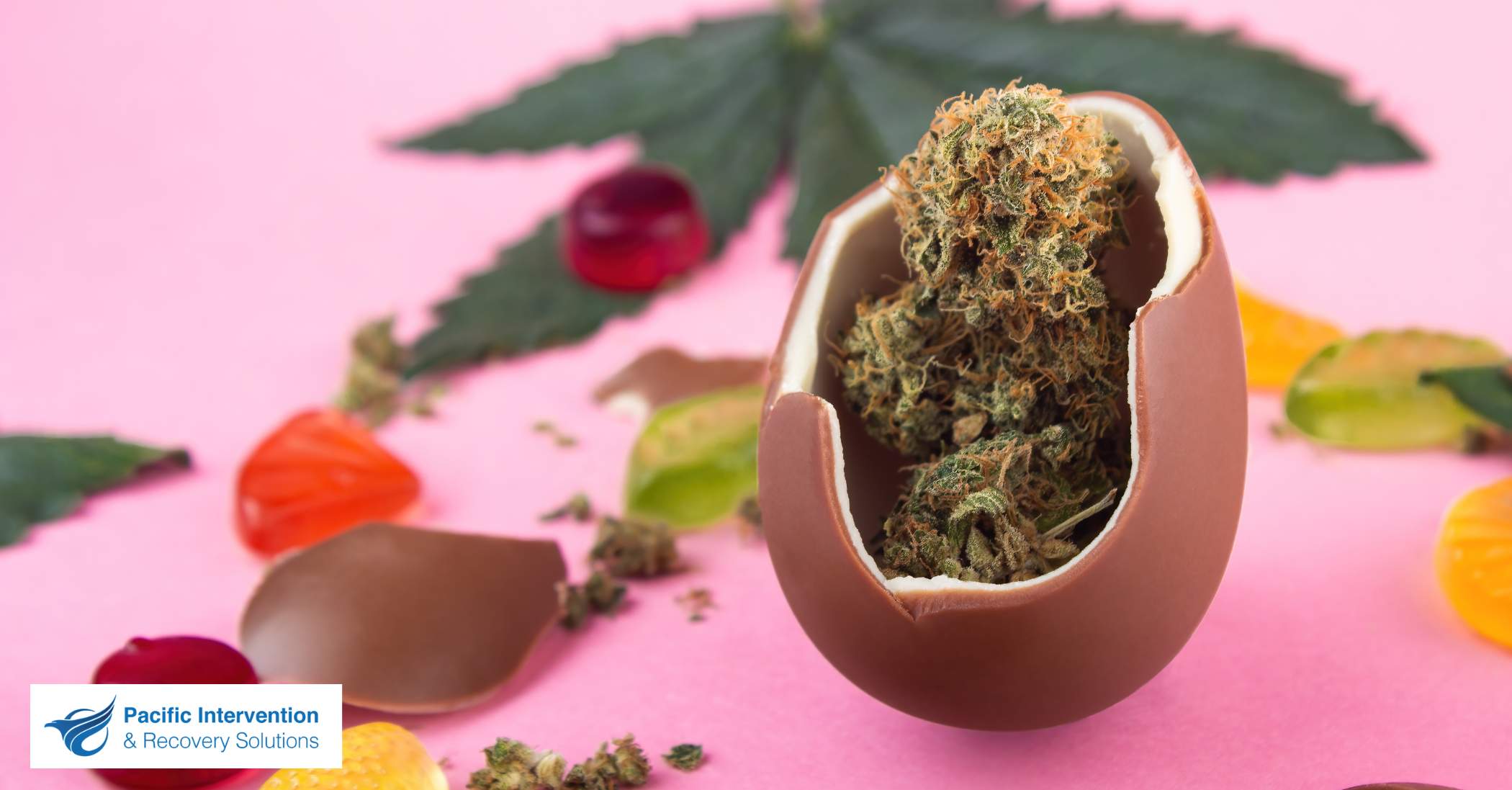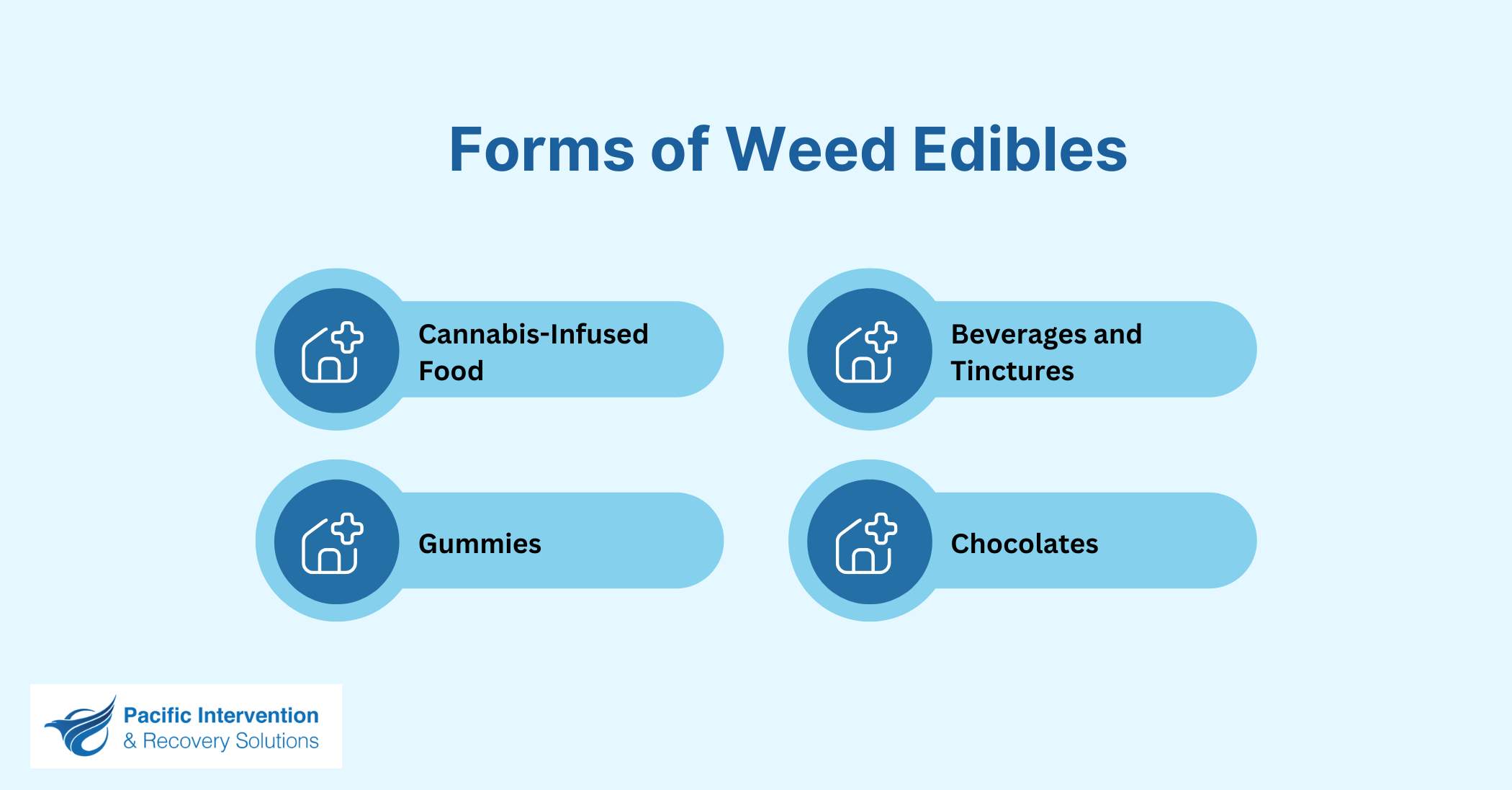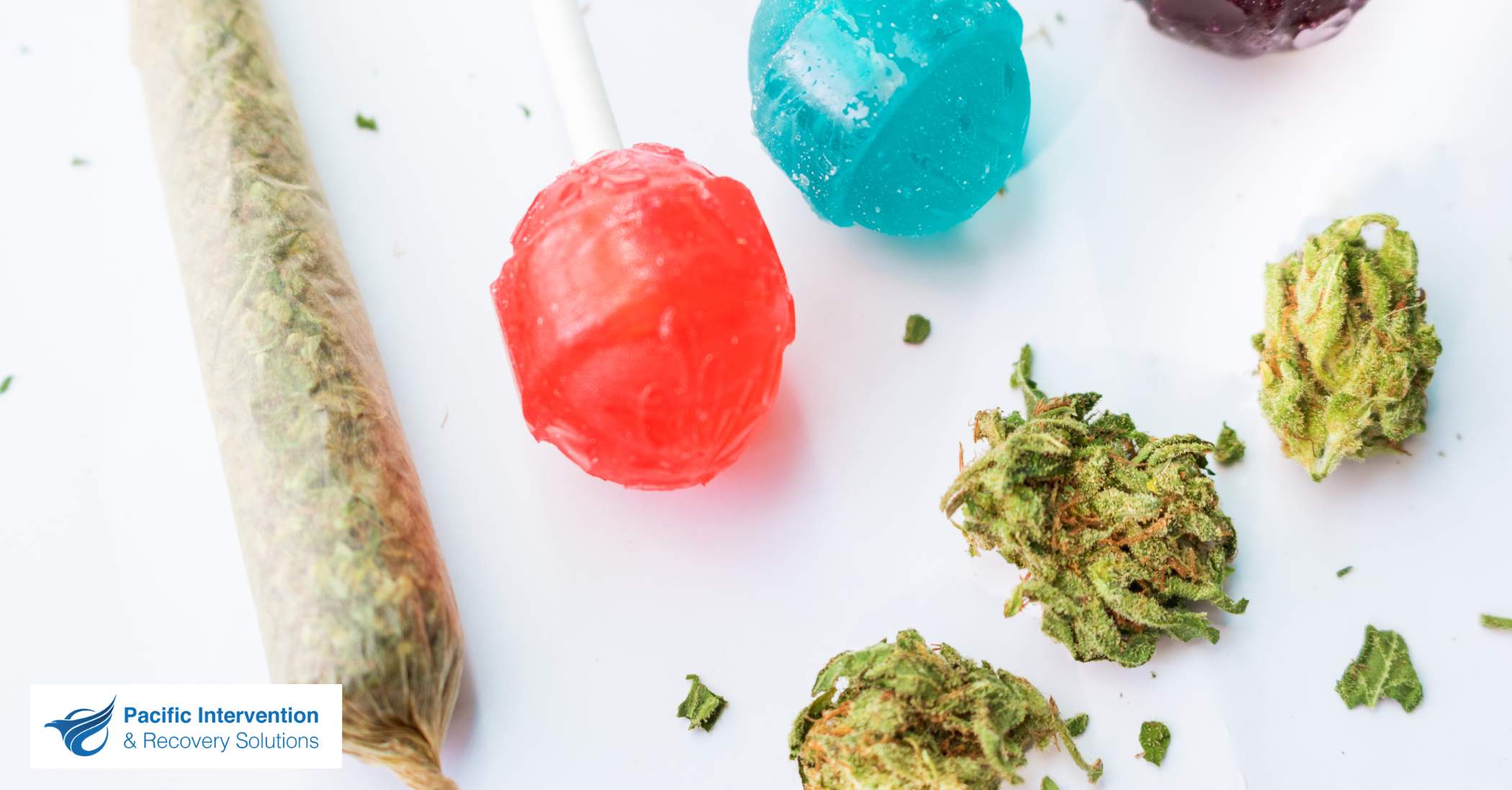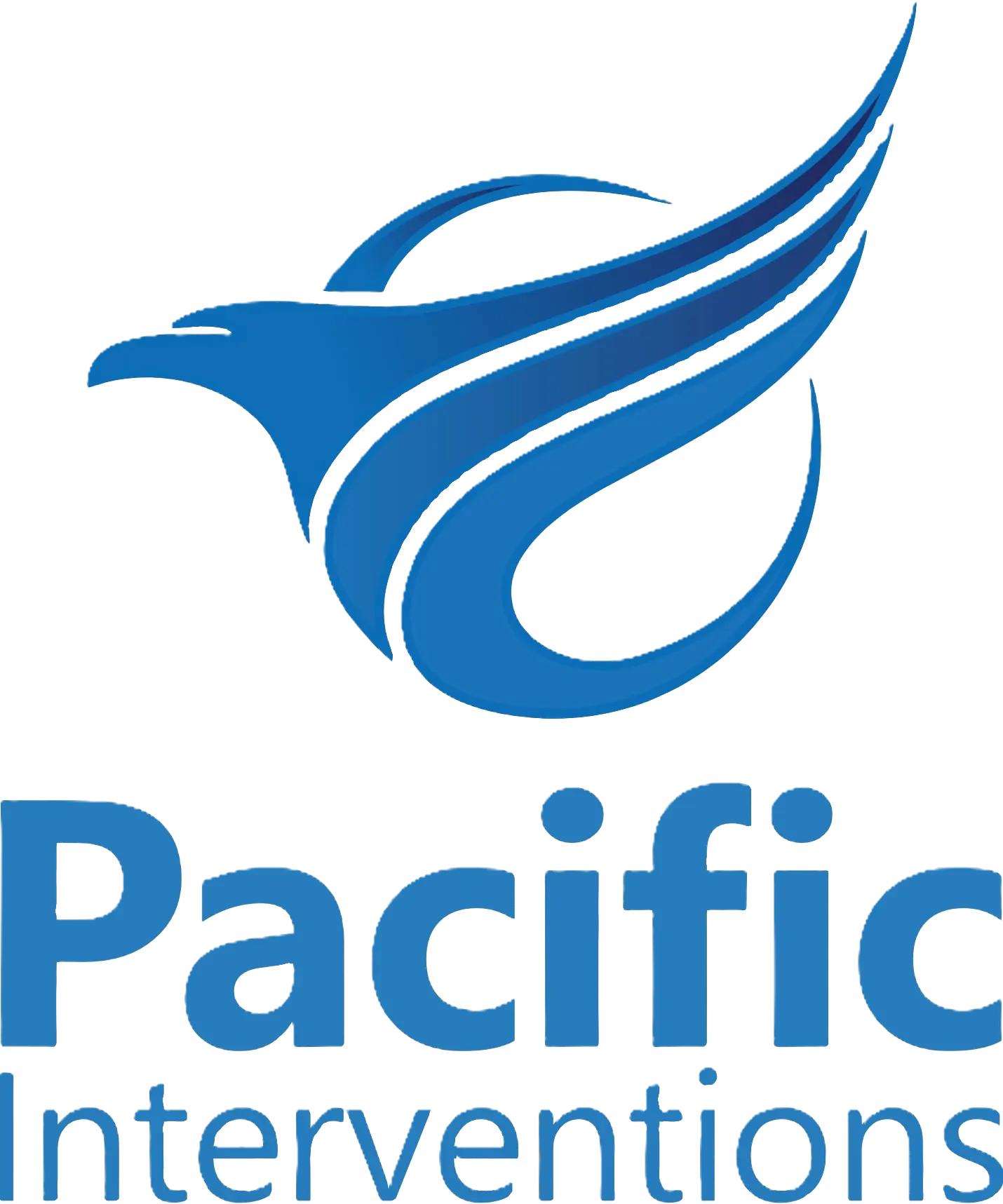In recent years, weed edibles have gained popularity as cannabis legalization expands. These cannabis-infused foods and drinks offer an alternative to smoking or vaping marijuana, providing a discreet and often enjoyable way to consume it.
However, for individuals dealing with addiction or in recovery, understanding the effects, side effects, and risks of weed edibles is essential. While they may appear safe or even beneficial, edibles can present unique challenges, particularly for those recovering from substance use disorders.
At Pacific Interventions, we specialize in treatment and counselling for individuals struggling with alcohol and drug addiction. Our evidence-based solutions are designed to support lasting recovery and informed decision-making.
In this guide, we’ll explore what weed edibles are, their effects on the body, and the risks they pose to help you make well-informed choices.

What are weed edibles?
Weed edibles are food or beverage products infused with cannabis. Cannabis, commonly known as marijuana or weed, comes from the dried flowers, seeds, stems, and leaves of the Cannabis sativa L plant.
Edibles typically contain THC, the compound responsible for the psychoactive “high,” and CBD, which does not cause a high but may help with anxiety or pain relief. These products are used recreationally and for the management of health conditions.
Unlike smoking or vaping, edibles offer a discreet and enjoyable way to consume cannabis. While smoking delivers quick effects, edibles take longer to kick in but produce effects that last much longer.
Forms of Weed Edibles
Weed edibles are available in various forms, allowing people to incorporate cannabis into their diet in enjoyable and discreet ways. Here are some popular types:

Cannabis-Infused Food
Cannabis-infused foods, such as brownies and cookies, are classic options, but the variety extends to candy, pasta sauces, potato chips, and even bacon. These products cater to personal preferences and dietary needs, offering a smoke-free alternative.
For medical users, edibles provide long-lasting relief from conditions such as arthritis, inflammation, and anxiety, making them ideal for sustained comfort.
Gummies
Cannabis-infused gummies are among the most popular edibles. They are often flavoured, come in various doses, and provide a discreet, easy-to-dose option for users.
Beverages and Tinctures
Cannabis beverages, such as teas, sparkling waters, tonics, and kombucha, offer a flexible and enjoyable way to consume cannabis throughout the day.
Tinctures, on the other hand, are highly concentrated and require precise dosing. They can be added to food or drinks or taken sublingually (under the tongue) for faster effects. Tinctures are particularly helpful for medical issues like chronic pain, anxiety, and insomnia.
Chocolates
Cannabis-infused chocolates, including bars and truffles, are a favourite for their rich taste and convenient packaging. They come in various strengths, making them suitable for a range of preferences.
Short-Term and Long-Term Effects of Weed Edibles
Consuming cannabis edibles takes longer to produce effects compared to smoking or vaping. This delay can lead to accidental overconsumption, increasing the risk of cannabis poisoning. While edibles offer a smoke-free alternative, they pose similar health risks to other cannabis products.
Short-Term Effects
Edibles can cause a range of immediate effects, including:
- Anxiety, fear, or panic
- Confusion and dizziness
- Vomiting or fainting
- Increased heart rate (heightened risk for those with heart conditions)
- Paranoia or delusional thoughts
- Difficulty concentrating or remembering
- Slower reaction times
- Drowsiness and respiratory depression
Long-Term Side Effects
Regular or heavy use of edibles may lead to:
- Addiction and dependence
- Impaired concentration and decision-making skills
- Increased risk of mental health issues, such as psychosis or schizophrenia

Weed Edibles vs Smoking Cannabis
When cannabis is smoked, THC enters the lungs, quickly absorbing into the bloodstream and reaching the brain.
In contrast, consuming cannabis edibles sends THC through the stomach and liver, where it is converted into a more potent form. This process results in a slower onset of effects but often produces a stronger and longer-lasting high compared to smoking.
While edibles are gentler on the lungs than smoking, caution is still necessary, especially for first-time users. Overconsumption can lead to unpleasant side effects due to delayed onset.
Some users prefer smoking for its rapid effects and predictable high, but edibles are increasingly popular for being more discreet, convenient, and less harmful to respiratory health. However, few studies have compared the two methods, leaving some questions about their long-term impacts unanswered.
Edibles Dosage
Determining the amount of THC or other substances in homemade edibles can be difficult, making it crucial to start with a small dose. Experts suggest avoiding cannabis edibles with more than 2.5 milligrams of THC for beginners.
Psilocybin, another substance used in specific contexts, is safe in doses of 10 to 25 milligrams. Regardless of the substance, always verify the dosage and ingredients of edibles before consuming. Start with a low dose and wait to assess its effects before taking more.
Overconsumption of cannabis edibles can lead to unpleasant side effects, as THC takes time to enter your system. This delay may cause you to consume more than intended, resulting in symptoms such as confusion, paranoia, or psychosis-like effects.
While excessive THC intake is rarely fatal, it can significantly impact your well-being and increase the risk of self-harm.
Conclusion
Weed edibles offer a discreet and convenient way to consume cannabis, but understanding their side effects and risks is crucial, particularly for those in recovery or struggling with addiction.
While they may appear safer than smoking, edibles come with unique challenges, such as delayed effects, a higher risk of overconsumption, and potential long-term impacts on mental health.
At Pacific Interventions, we specialize in providing treatment, counselling, and support for individuals and families dealing with addiction. Our evidence-based strategies and personalized care plans help clients overcome challenges and build a healthier future.
Making informed decisions about substances is vital for maintaining recovery. If you or a loved one is uncertain about the role of cannabis or weed edibles in your life, seeking professional advice can ensure your recovery remains safe and sustainable.
Contact Pacific Interventions today to explore our services and connect with a counsellor dedicated to supporting your journey toward lasting recovery.



